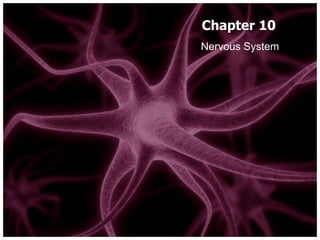
Chapter 10 & 22 BUS116
- 1. Chapter 10 Nervous System
- 2. Levels of Nervous System Central Nervous System (CNS): Brain and spinal cord Peripheral Nervous System (PNS): 12 pairs of cranial nerves, 31 pairs of spinal nerves and the autonomic nervous system Nerves within PNS are: Afferent (sensory) – transmit impulses to CNS Efferent (motor) – transmit impulses away from CNS Autonomic Nervous System Sympathetic – causes reactions Parasympathetic – causes sympathetic reaction to calm down/counteracts the sympathetic reaction
- 3. Neurons Picks up an impulse and transmits it via the spinal cord to the action device CNS (afferent nerve) or muscle (efferent nerve)
- 4. What Happens in a Neuron? Acetylcholine – chemical present at synapse to help make the connection Cholinesterase – counteracting chemical to stop connection
- 5. Other Cells in the Nervous System Astrocytes – “star cells” Microglia – “small glue” Oligodendroglia – “few/scanty dendrite glue” Ependymal cells – “upper garment”
- 6. The Brain Cerebrum: Largest part of brain; Right and left hemisphere with each hemisphere having four major lobes: frontal, occipital, temporal and parietal Ventricles: Spaces and canals that contain cerebrospinal fluid that flows throughout the brain and around the spinal cord Thalamus: Coordinates sensory impulses to brain Hypothalamus: Controls body temp, sleep, appetite, sexual desire, emotions; regulates hormone release from pituitary gland Brain Stem: Cerebellum – voluntary movement, maintain balance, posture, muscle tone Pons – nerve fiber tracts that connect cerebellum and cerebrum to rest of brain Medulla Oblongata – nerve tracts cross so right side of body is controlled by left side of brain and vice versa Respiratory, cardiac and vasomotor center
- 7. Spinal Cord Gray Matter – neuron cells bodies White matter – axon coated with myelin sheath
- 8. Meninges Three layers of connective tissue Dura mater: thick protective membrane just below skull Subdural space located under dura mater and contains many blood vessels Arachnoid membrane: resembles a spider web Arachnoid space: open web below arachnoid membrane Pia mater: layer closet to brain KNOW YOUR CRANIAL NERVES AND FUNCTIONS!
- 9. Pathologic Conditions to Know Hydrocephalus Normally congenital Head swells – increased pressure inside brain Objective is to get increased fluid off of brain with a shunt
- 10. Spina Bifida Imperfect union of the vertebra Spina bifida occulta – malunion or absence of a vertebra is only detected on x-ray Spina bifida cystica – very serious; meninges of spinal cord protrude through vertebral opening and form a cyst to outside of body
- 11. More Conditions to Know Alzheimer’s Disease Amyotrophic lateral sclerosis Epilepsy Huntington Disease Multiple Sclerosis Myasthenia Gravis Palsy Parkinson’s Disease Tourette Syndrome Herpes Zoster (shingles) Meningitis HIV encephalopathy Brain Tumors Cerebral Concussion & Cerebral Contusion
- 12. Cerebrovascular Accident (CVA/Stroke) Brain tissue dies because of lack of blood flow to a portion of brain Transient ischemic attack (TIA) – lose a period of time in short term memory 3 Major causes of CVA Thrombus (clot) Embolus (floating clot) Hemorrhage (ruptured vessel)
- 13. Results of Stroke Seen on opposite side of the body from which the stroke took place Affects depend on the portion of the brain that has been destroyed Hemiparesis (slight paralysis) Hemiplegia (paralysis on right or left side of body) Flaccid – no muscle contractions Spastic – remain contracted/stiff
- 14. Know These! The Laboratory Tests/Clinical Procedures at End of Chapter
- 16. What To Know What is the DSM-IV-TR? What is the difference between a psychiatrist and a psychologist? Know the Psychiatric clinical symptoms Know the vocabulary (general terms, symptoms, and disorders) Know the phobias Abbreviations AD ADHD DSM-IV-TR ECT MMPI OCD SAD TAT WAIS WISC